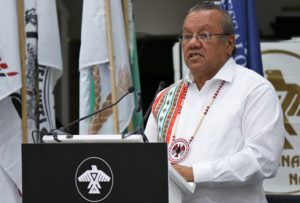Anishinabek Chiefs-in-Assembly unanimously oppose small modular reactors on Anishinabek territory

ANISHINABEK NATION HEAD OFFICE (June 12, 2019)—The Anishinabek Nation Chiefs-in-Assembly sent a strong message to the nuclear industry and the governments of Canada and Ontario on June 6 at the Anishinabek Nation Grand Council Assembly in Chippewas of Georgina Island First Nation. The Chiefs unanimously endorsed a Grand Council Resolution stating their clear opposition to the construction, operation, storage or disposal of small modular reactors (SMRs) in the territory of the Anishinabek Nation, including bodies of water.
“We, as Anishinabek, have the responsibility to act as stewards of our lands and waters,” states Anishinabek Nation Grand Council Chief Glen Hare. “SMRs and nuclear power in general represents an unacceptable risk to our Nation. The Anishinabek Nation is vehemently opposed to any effort to situate SMRs within our territory. The stance we have taken is in support of the seven generations to come.”
Small Modular Reactors are not only smaller in scale than the types of nuclear power reactors that many Ontarians are familiar with, but are also transportable. Industry proponents of the SMRs are positioning this technology as a cheap energy and heating source for remote communities. The largest push to adopt these small nuclear fission reactors has come from those in the industry who are looking for cheap energy to power their mines and other industrial developments. The federal government has now put their support behind the SMRs.
“The Anishinabek Nation has advised the Senate Review Committee on Bill C-69 of our opposition to the effort of the nuclear industry in seeking exemptions from the Canadian Environmental Assessment Act,” adds Grand Council Chief Hare. “The nuclear industry must be subject to public review and comment; compliance to Canada’s Environmental Assessment Act would ensure this.”
Bill C-69, An Act to enact the Impact Assessment Act and the Canadian Energy Regulator Act, to amend the Navigation Protection Act and to make consequential amendments to other Acts, changes how major infrastructure projects are assessed and approved, including oil and gas pipelines, electricity transmission and major highway and ports. The Bill recently underwent its Third Reading and was passed by the Senate with amendments on June 6.
Anishinabek leaders are concerned with potential environmental implications of SMRs. These reactors are small in scale but could contribute to the growing amount of nuclear waste that the federal government is looking to dispose of somewhere in Ontario.
“While other countries are shifting away from nuclear energy to more sustainable sources for their energy needs, Canada appears to be welcoming the expansion of the nuclear industry, with limited assurance on the safe containment of radioactive waste,” expresses Grand Council Chief Hare. “I am concerned that Canada may become the radioactive dump of the world as other countries seek to dispose of their radioactive waste.”
The Anishinabek Nation has been working with the Iroquois Caucus to oppose the transportation and disposal of nuclear waste in Anishinabek territory for many years. The Grand Council Resolution put forth is in line with a similar resolution passed by the Assembly of First Nations that demands the federal government uphold the United Nations Declaration on the Rights of Indigenous Peoples Article 29. The Article reads, “States shall take effective measures to ensure that no storage or disposal of hazardous materials take place in the lands and territories of Indigenous peoples without their free, prior and informed consent.”

